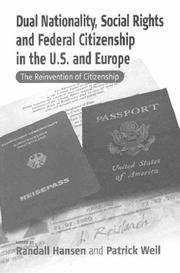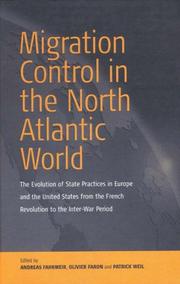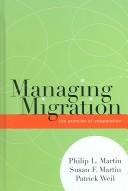| Listing 1 - 10 of 10 |
Sort by
|
Book
ISBN: 1283898217 0812206215 0812222121 Year: 2013 Publisher: Philadelphia : University of Pennsylvania Press,
Abstract | Keywords | Export | Availability | Bookmark
 Loading...
Loading...Choose an application
- Reference Manager
- EndNote
- RefWorks (Direct export to RefWorks)
Present-day Americans feel secure in their citizenship: they are free to speak up for any cause, oppose their government, marry a person of any background, and live where they choose-at home or abroad. Denaturalization and denationalization are more often associated with twentieth-century authoritarian regimes. But there was a time when American-born and naturalized foreign-born individuals in the United States could be deprived of their citizenship and its associated rights. Patrick Weil examines the twentieth-century legal procedures, causes, and enforcement of denaturalization to illuminate an important but neglected dimension of Americans' understanding of sovereignty and federal authority: a citizen is defined, in part, by the parameters that could be used to revoke that same citizenship.The Sovereign Citizen begins with the Naturalization Act of 1906, which was intended to prevent realization of citizenship through fraudulent or illegal means. Denaturalization-a process provided for by one clause of the act-became the main instrument for the transfer of naturalization authority from states and local courts to the federal government. Alongside the federalization of naturalization, a conditionality of citizenship emerged: for the first half of the twentieth century, naturalized individuals could be stripped of their citizenship not only for fraud but also for affiliations with activities or organizations that were perceived as un-American. (Emma Goldman's case was the first and perhaps best-known denaturalization on political grounds, in 1909.) By midcentury the Supreme Court was fiercely debating cases and challenged the constitutionality of denaturalization and denationalization. This internal battle lasted almost thirty years. The Warren Court's eventual decision to uphold the sovereignty of the citizen-not the state-secures our national order to this day. Weil's account of this transformation, and the political battles fought by its advocates and critics, reshapes our understanding of American citizenship.
Expatriation --- Citizenship, Loss of --- Citizenship --- International law --- Statelessness --- Denaturalization --- Loss of citizenship --- Political rights, Loss of --- Birthright citizenship --- Citizenship (International law) --- National citizenship --- Nationality (Citizenship) --- Political science --- Public law --- Allegiance --- Civics --- Domicile --- Political rights --- History --- Law and legislation --- Human Rights. --- Law. --- Political Science. --- Public Policy.
Book
ISBN: 9780674291614 Year: 2023 Publisher: Cambridge, Mass. Harvard University Press
Abstract | Keywords | Export | Availability | Bookmark
 Loading...
Loading...Choose an application
- Reference Manager
- EndNote
- RefWorks (Direct export to RefWorks)
Bullitt, William Christian [Jr.] --- Freud, Sigmund --- Wilson, Thomas Woodrow
Book
ISBN: 9780812206210 Year: 2012 Publisher: Philadelphia
Abstract | Keywords | Export | Availability | Bookmark
 Loading...
Loading...Choose an application
- Reference Manager
- EndNote
- RefWorks (Direct export to RefWorks)
Book
Year: 1998 Publisher: San Domenico (FI) : European university institute,
Abstract | Keywords | Export | Availability | Bookmark
 Loading...
Loading...Choose an application
- Reference Manager
- EndNote
- RefWorks (Direct export to RefWorks)

ISBN: 1571818049 1571818057 9781571818058 9781571818041 1789204119 9781789204117 Year: 2002 Publisher: New York: Berghahn,
Abstract | Keywords | Export | Availability | Bookmark
 Loading...
Loading...Choose an application
- Reference Manager
- EndNote
- RefWorks (Direct export to RefWorks)
Dual nationality --- Conflict of laws --- Double nationalité --- Nationalité (Droit international privé) --- Citizenship --- Citizenship. --- Double nationalité --- Nationalité (Droit international privé) --- Dual nationality - United States --- Dual nationality - Europe --- Conflict of laws - Citizenship --- Double nationality --- Dual allegiance --- Dual citizenship --- Nationality, Dual --- Nationality, Plural --- Plural nationality --- Law and legislation

Abstract | Keywords | Export | Availability | Bookmark
 Loading...
Loading...Choose an application
- Reference Manager
- EndNote
- RefWorks (Direct export to RefWorks)
Book
ISBN: 9780822343318 Year: 2008 Publisher: Durham (N.C.) Duke University Press
Abstract | Keywords | Export | Availability | Bookmark
 Loading...
Loading...Choose an application
- Reference Manager
- EndNote
- RefWorks (Direct export to RefWorks)

ISBN: 9781571813282 1571813284 157181812X 9781571818126 1789203988 9781789203981 Year: 2003 Publisher: New York Berghahn Books
Abstract | Keywords | Export | Availability | Bookmark
 Loading...
Loading...Choose an application
- Reference Manager
- EndNote
- RefWorks (Direct export to RefWorks)
The migration movements of the 20th century have led to an increased interest in similarly dramatic population changes in the preceding century. The contributors to this volume - legal scholars, sociologists, political scientist and historians - focus on migration control in the 19th century, concentrating on three areas in particular: the impact of the French Revolution on the development of modern citizenship laws and on the development of new forms of migration control in France and elsewhere; the theory and practice of migration control in various European states is examined, focusing on the control of paupers, emigrants and "ordinary" travelers as well as on the interrelationship between the different administrative levels - local, regional and national - at which migration control was exercised. Finally, on the development of migration control in two countries of immigration: the United States and France. Taken altogether, these essays demonstrate conclusively that the image of the 19th century as a liberal era during which migration was unaffected by state intervention is untenable and in serious need of revision
Europe, Western --- United States --- Europe --- Emigration and immigration --- Government policy --- History --- Europe, Western - Emigration and immigration - Government policy - History --- United States - Emigration and immigration - Government policy - History --- Europe - Emigration and immigration - History --- Europe - Emigration and immigration - Government policy - History --- History. --- West Europe --- Western Europe --- History of Europe --- History of North America --- anno 1800-1899 --- Europe de l'Ouest --- Etats-Unis --- Emigration et immigration --- Politique gouvernmentale --- Histoire --- Politique gouvernementale

ISBN: 0739113402 0739157485 9780739157480 Year: 2006 Publisher: Lanham Lexington Books
Abstract | Keywords | Export | Availability | Bookmark
 Loading...
Loading...Choose an application
- Reference Manager
- EndNote
- RefWorks (Direct export to RefWorks)
Managing Migration presents the valuable results of the Cooperative Efforts to Manage Emigration project, a bottom-up effort to identify models and best practices for spurring economic development and respect for human rights in migrant countries of origin.
Emigration and immigration --- Government policy. --- Economic aspects.
Book

ISBN: 9780231176125 9780231540674 0231540671 Year: 2017 Publisher: New York, NY
Abstract | Keywords | Export | Availability | Bookmark
 Loading...
Loading...Choose an application
- Reference Manager
- EndNote
- RefWorks (Direct export to RefWorks)
Journalism After Snowden is essential reading for citizens, journalists, and academics in search of perspective on the critical need for investigative journalism in an age of heightened surveillance. The book features contributions from key players involved in the reporting of leaks of classified information by Edward Snowden, including Alan Rusbridger, former editor-in-chief of the Guardian; Jill Abramson, former executive editor of the New York Times; legal scholar and journalist Glenn Greenwald, Snowden himself. Steve Coll, Clay Shirky, Cass Sunstein, and Julia Angwin are among the other contributors. Topics include protecting sources, digital security practices, interpreting journalistic privilege in the digital age, access to classified data, and understanding the impact of the Internet and telecommunications policy on journalism.
Freedom of the press --- Liberté de la presse --- Journalism --- Journalisme --- Confidential communications --- Secret professionnel --- History --- Histoire --- Political aspects --- Aspect politique --- Press --- Presse --- Snowden, Edward J., --- Liberté de la presse
| Listing 1 - 10 of 10 |
Sort by
|

 Search
Search Feedback
Feedback About UniCat
About UniCat  Help
Help News
News